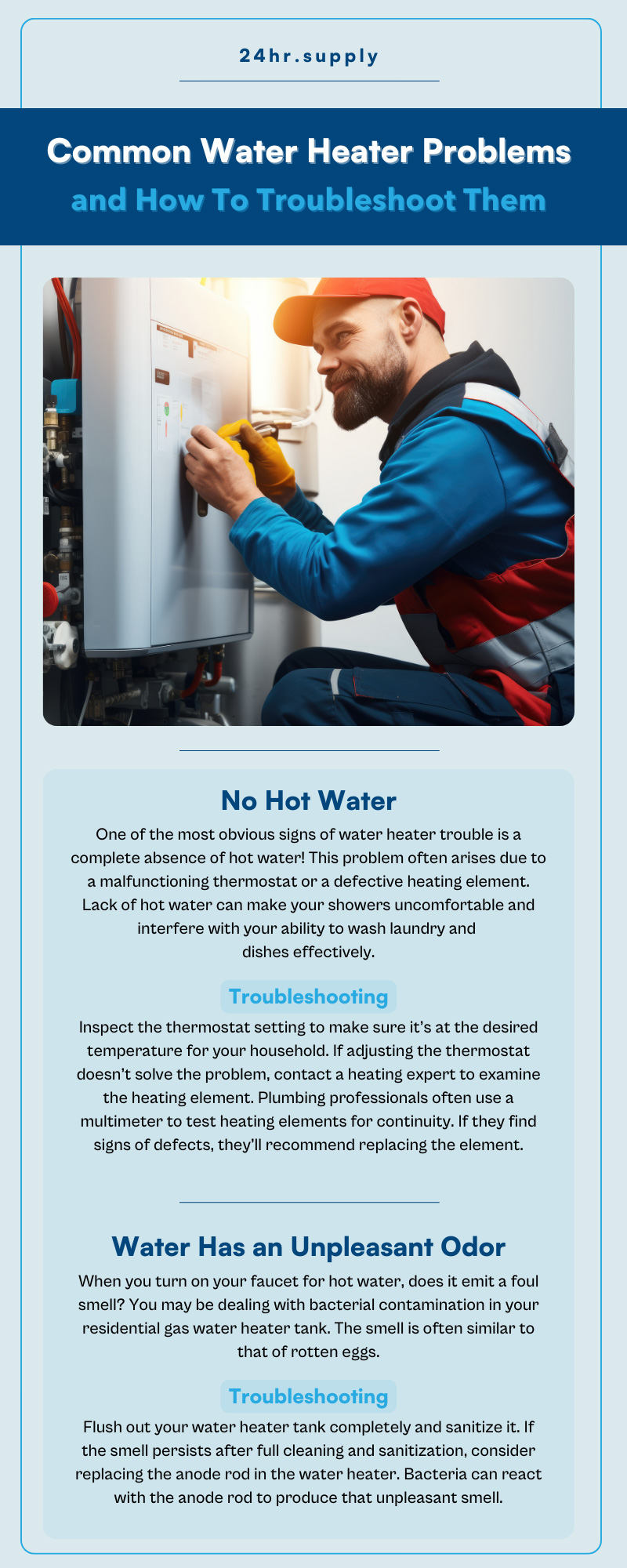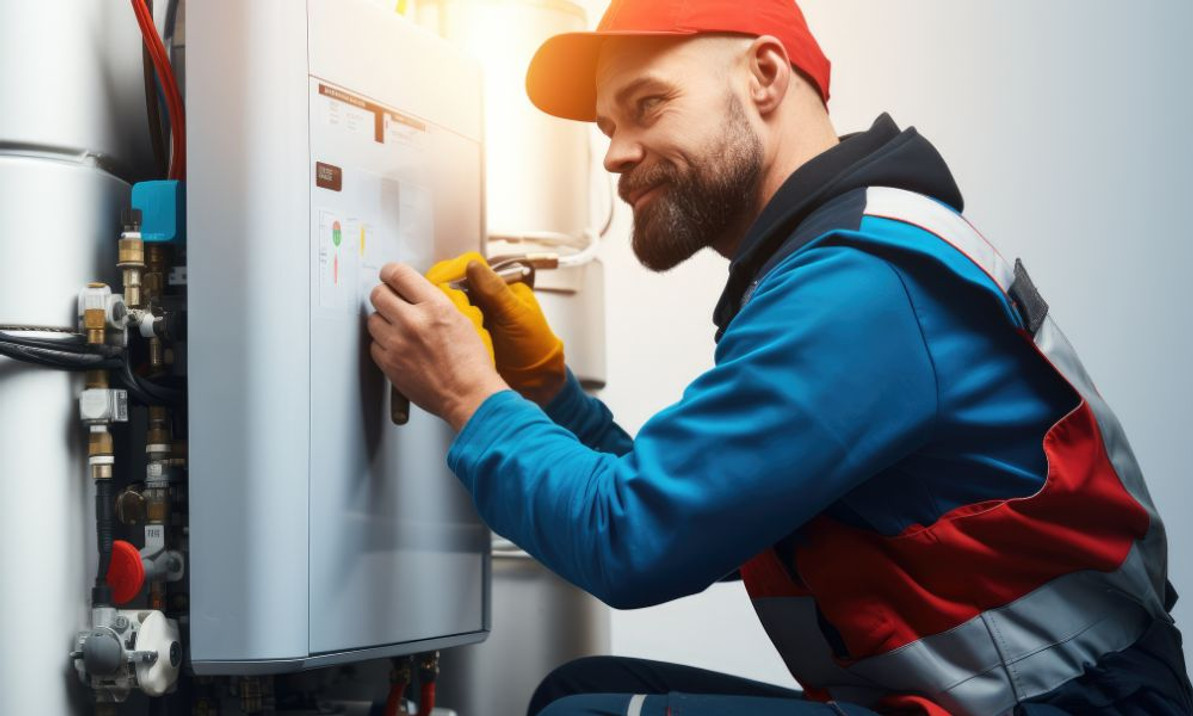8 Common Water Heater Problems and How To Troubleshoot Them
Hot water heaters are truly the unsung heroes of many homes. They serve a crucial role in the daily routine of any household, from morning showers to after-dinner dishwashing. However, like any other household appliance, they can encounter issues that disrupt their functionality and, consequently, the comfort of the household.
Are you finding yourself freezing in cold showers or facing an unexplained hike in your energy bills? These water heater issues are annoying to deal with. How can you troubleshoot common water heater problems and get your home’s comfort and functionality back up to your standards?
Let’s delve into some of the most common problems with residential water heaters and review how to resolve them. By understanding these issues, you can ensure that your water heater stays in optimal condition for years to come.
No Hot Water
One of the most obvious signs of water heater trouble is a complete absence of hot water! This problem often arises due to a malfunctioning thermostat or a defective heating element. Lack of hot water can make your showers uncomfortable and interfere with your ability to wash laundry and dishes effectively.
Troubleshooting
Inspect the thermostat setting to make sure it’s at the desired temperature for your household. If adjusting the thermostat doesn’t solve the problem, contact a heating expert to examine the heating element. Plumbing professionals often use a multimeter to test heating elements for continuity. If they find signs of defects, they’ll recommend replacing the element.
Water Has an Unpleasant Odor
When you turn on your faucet for hot water, does it emit a foul smell? You may be dealing with bacterial contamination in your residential gas water heater tank. The smell is often similar to that of rotten eggs.
Troubleshooting
Flush out your water heater tank completely and sanitize it. If the smell persists after full cleaning and sanitization, consider replacing the anode rod in the water heater. Bacteria can react with the anode rod to produce that unpleasant smell.
Sediment Accumulation
If you live in an area with hard water, sediment and limescale can build up in your water heater. This scaly accumulation can cause the heater to function less efficiently and possibly lead to blockages in your pipes. The sediment primarily consists of calcium and magnesium, which aren’t harmful to drink in small amounts. But over time, they can build up into a crusty layer that’s difficult to remove.
Troubleshooting
Flush your water heater tank regularly, especially if you’re aware of the hard water issue in your home. For more severe cases of sediment buildup, you may need to use a deliming solution to loosen it. Consider installing a water softener system to combat the calcium and magnesium in your water that caused the buildup.
Leaking Water Heater
During your regular inspections of your water heater tank, do you notice water pooling at the bottom? Water leaks often signal poor plumbing connections, leaking gaskets, or a corroded storage tank.
Troubleshooting
Closely inspect the area around the tank and all fittings to look for any signs of leakage. If you notice the tank itself is the source of the leak, you may have a serious internal problem. Call a professional as soon as possible to remedy leaks in your water tank.
Faulty T&P Valve
Your water heater’s temperature and pressure relief valve (commonly called the T&P valve) serves a critical role in the heater’s continued function and safety. When the pressure or temperature inside the tank exceeds safe levels, a functional T&P valve releases water. However, if the valve malfunctions, the water in your tank can overheat, or pressure inside can build to dangerous levels.
Troubleshooting
Locate the T&P valve on your water heater, using your owner’s manual as a guide if necessary. Check the valve for signs of damage or corrosion. If it appears faulty, then replacing it with a new part should fix the problem.
Inconsistent Water Temperature
Does your home’s water supply fluctuate wildly from freezing cold to scalding hot? These extreme swings in temperature can indicate a malfunctioning thermostat or one that simply has an incorrect setting.
Troubleshooting
Adjust the thermostat to your desired temperature range. If the problem persists despite your adjustments, the thermostat may be defective. Luckily, it’s an easy replacement for a professional to perform!
Noisy Water Heater
If you hear a rumbling, popping, or cracking sound from your water heater, it often indicates a buildup of sediment at the bottom of the tank. We’ve already discussed other ways that sediment accumulation can affect your water heater’s functionality, but that popping noise is certainly a disturbing one.
Troubleshooting
Next time you hear worrisome noises coming from your water heater tank, shut off the water and power supply to the heater. Attach a garden hose to the drain valve and direct the other end to a suitable drainage point. Open the drain valve and allow the water to flow out until it runs clear. Once you finish, close the valve, refill the tank, and restore the power supply.
Discolored Water
When you turn on your faucet, is the water that comes out brown or rusty in color? That unappealing hue is often a sign of corrosion inside your pipes or inside the tank itself.
Troubleshooting
The first line of defense against rusty water is to flush the tank to remove any sediment. If the discoloration persists, the corrosion inside your water tank could be beyond repair. It may be time to replace the water heater because that corrosion could worsen and lead to costly leaks over time.
Understanding the common problems associated with water heaters andhow to troubleshoot them can save you significant time and money. Frequent culprits for water heater trouble include foul odors, rusty discoloration, faulty valves, and sediment buildup. Luckily, all these problems and more are solvable with diligent inspections and professional assistance where necessary.
Next time you run into an issue with your water heater, keep this guide handy so that you can respond to problems promptly and effectively. Remember—routine maintenance can prevent many of these problems from arising in the first place, extending your water heater’s lifespan and ensuring optimal efficiency.

Recent Posts
-
What To Look For in a New Sewage Pump for Your Home
A reliable sewage pump is essential for maintaining a clean and functional home, particularly in are …Jul 26th 2024 -
How To Keep Your Commercial Boiler in Prime Condition
Keeping your commercial boiler in top shape is not optional for your business. A well-maintained boi …Jul 12th 2024 -
Tank vs. Tankless Water Heater: Which Is Right for You?
Are you looking to upgrade your home or office’s heating system? With various options available, it …Jul 10th 2024




